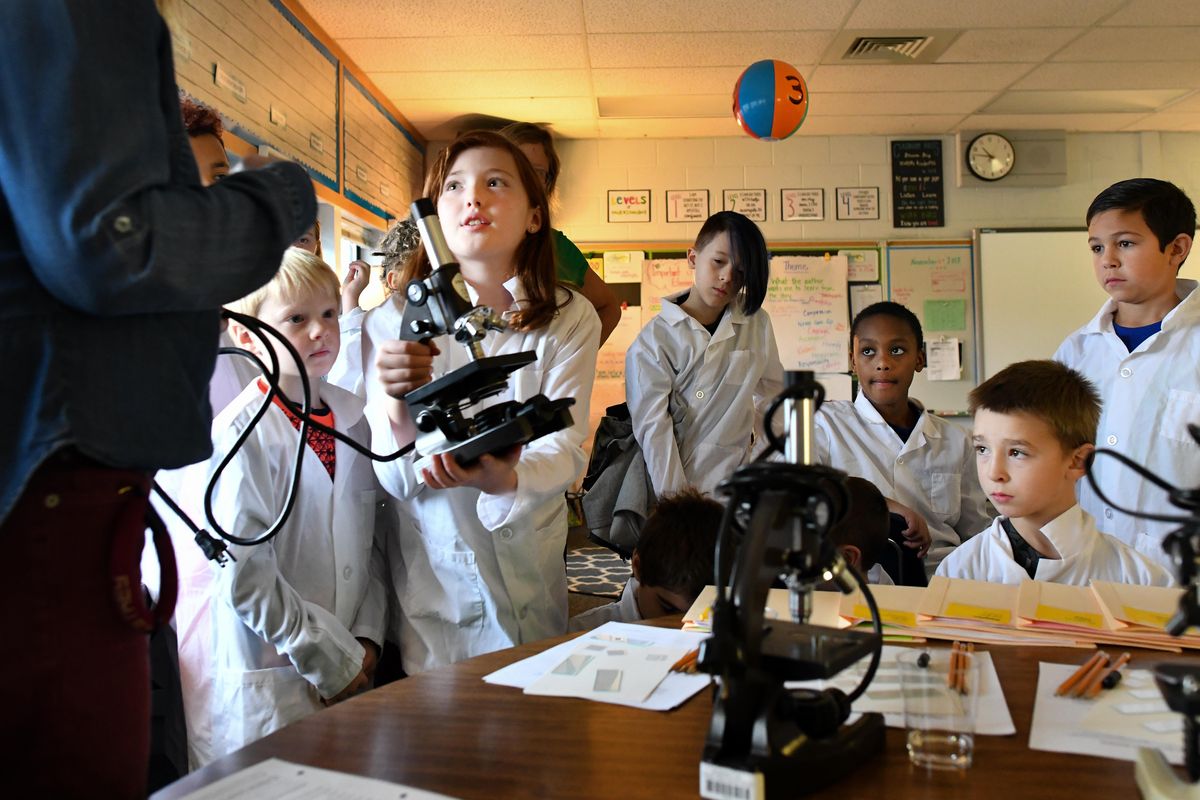Progress Elementary experimenting with electives

Educators and students at Spokane Valley’s Progress Elementary School are in the midst of an experiment to launch a STEM program that includes offering all students in grades K-5 the opportunity to take electives.
The student enrollment at Progress used to be 450, but the new Riverbend Elementary has dropped that to 300, giving the school room to work with. “It was a great time to capitalize on that,” said Matt Chisholm, the Progress principal. Progress is part of the Central Valley School District.
Chisholm met with his staff to ask them what they would like to do differently, and they came up with the idea to offer electives as a way to get students engaged in learning, not just doing lessons.
“We then put a team together and put about a year and a half into creating a plan,” he said. “We want to provide kids some choice. It’s not just a STEM school.”
This is the first school year the program has been in effect, but word got out into the community. “We are still a neighborhood school, but we’ve had a lot of students choice into our school,” he said.
Electives are offered every Thursday. The third to fifth grades have electives in the morning and grades K-3 have them in the afternoon.
“We’re starting small,” Chisholm said.
The electives operate on a trimester system, giving the students opportunities to pick several different classes during the year. Students in different grades mingle in the elective classes and work together in groups, but the kindergarten students met in their own elective classes for the first trimester. They’ll join the first and second grades in the other trimesters.
There’s a wide variety of electives to choose from, including forensics, coding, programming, gardening, photography, singing, leadership and “Ooey Gooey Mixtures.” There’s also a maker space, which is a classroom with a wall lined with bins full of various supplies. It’s staffed by Teacher of Innovation Ross Johnson, who helps the kids make roller coasters, catapults and airplanes.
“We’ve done a lot of building and structural things, especially with the younger grades,” Johnson said.
He said he and the other teachers are trying to be facilitators, not just providers of information. “It’s a process to get them to share their ideas in these untraditional ways,” Johnson said. “That’s been really neat to watch that unfold. You just see them take charge.”
The students gave input into what kinds of classes they wanted to see, and they’ll be consulted throughout the process to see what works and what doesn’t, Chisholm said.
“We started with an idea,” he said. “For second trimester we’re going back to the kids and asking if these things interest you.”
The students are learning about topics that interest them in classes that incorporate math, research, writing and problem solving. “Philosophically there’s a shift in the building,” Chisholm said. “It’s around a teaching shift on how to get kids curious.”
The program is somewhat different because it’s not specifically focused on getting kids ready for the various achievement tests they have to pass. Still, Chisholm said he expects the skills the students are learning will help them on the test and in their future.
“I think we will see an increase on the test,” he said. “I’m hoping we’ll see a correlation on our science skills.”
If the students are any indication, the electives are a hit. “Thursday is our highest attendance day at school and our lowest amount of discipline,” he said. “There’s a buzz about it.”
The school has already partnered with Mobius and the Spokane County Regional Health District. In the future Chisholm would like to bring in more experts.
“We want to expose our kids to opportunity,” he said. “To do that we need to bring the community into the building and the kids out into the community.”
He’d also like to have electives on more than just Thursday, but said he’s trying to play things by ear. “We’re going to kind of take that as it goes,” he said. “I don’t want to have many concrete plans. It’s organic.”